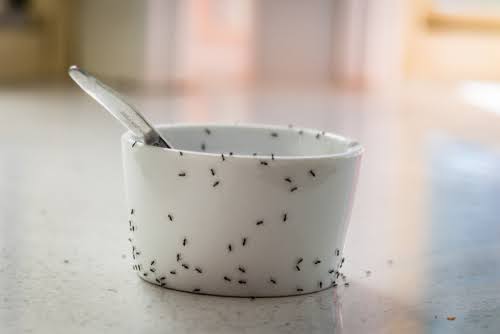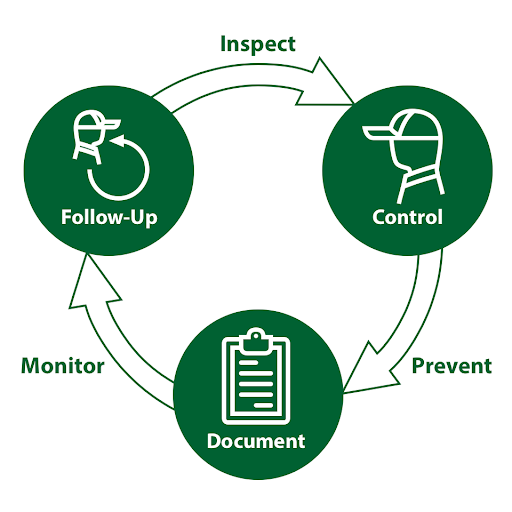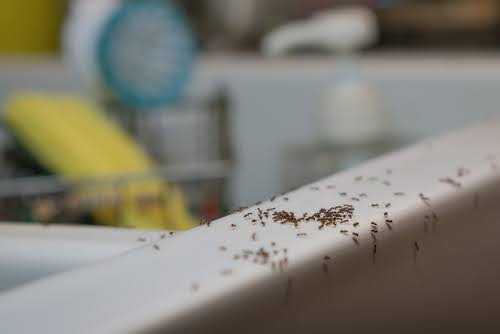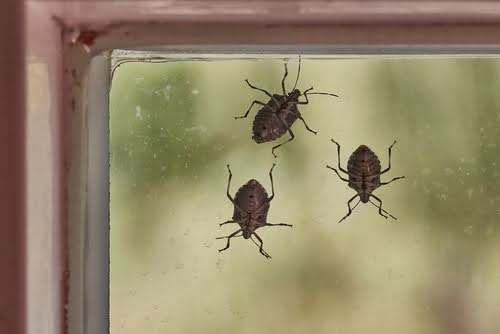Ants are relentless. If you’re unprepared for a possible ant infestation, you might find yourself in a never-ending battle, trying to squash these persistent pests without any real hope of eliminating them completely.
Rather than tolerating ants in your kitchen, taking proactive, preventative measures is key to ensuring they don't invade your space. Don't wait until it's too late. Explore our tips on how to keep ants out of the kitchen and maintain a pest-free environment:
Three Ways to Prevent an Ant Infestation in Your Kitchen
Ant infestations can be extremely tough to get rid of, so it’s best if you can prevent one from happening in the first place. The experts at Plunkett’s put together a few tips on ensuring your kitchen remains pest-free:
1. Block Entry Points
Ants are incredibly adept at finding the smallest of entryways into your home, turning even the tiniest of cracks into their personal doorways. That small crack in your window or the space under your front door can seem like a wide-open invitation to an ant.
The first step in ant prevention—and getting rid of ants in the kitchen—is to seal these entry points. While identifying every potential entry point can be challenging, start by focusing on the obvious ones:
- Window Frames and Doors: Small cracks or gaps around window frames and doors are prime entry points for ants. Inspect these areas regularly and use caulk to seal any openings.
- Utility Lines and Pipes: Ants can enter your home along utility lines (like electrical wires) or plumbing pipes. Seal gaps where these utilities enter your home with silicone caulk or foam sealant.
- Foundation Cracks: Over time, your home's foundation may develop small cracks. These cracks are an open invitation for ants. Use concrete repair caulk to fill them.
- Vents and Chimneys: Vents for appliances and chimneys can have gaps that allow ants inside. Consider installing fine mesh screens over these openings.
- The Space Beneath Doors: If there's a gap under your front or back door, it's essentially a welcome mat for ants. Door sweeps or thresholds can effectively block this entry point.
By blocking these entry points, you lessen the likelihood of ants setting up shop in your kitchen.
2. Maintain Cleanliness

The cornerstone of ant prevention lies in cleanliness. You might believe your cleaning efforts are sufficient, but even the smallest spill can attract ants. It's crucial to clean your countertops and floors regularly and thoroughly, ensuring any spills are promptly addressed. Postponing cleanup can lead to unwanted guests in your kitchen. Don't overlook areas like under the toaster, where breadcrumbs can accumulate. A few other ways to prevent ants through cleaning, include:
-
Sealing Open Food Containers: Open packages are invitations to ants. Make sure to:
- Store sugar, flour, and other baking goods in airtight containers.
- Use sealed bins for cereals, snacks, and pet food.
-
Cleaning Spills Immediately: Even tiny specks of sugar can attract ants. Ensure to:
- Wipe up spills on countertops and floors as soon as they happen.
- Regularly clean surfaces that may collect crumbs and residues, like under the toaster or kitchen sink area.
-
Managing Trash and Recycling: Garbage can be a feast for ants. To prevent this:
- Take out the trash regularly, ideally daily, to avoid buildup.
- Use bins with tight-fitting lids to keep ants out.
- Rinse containers before placing them in recycling bins to remove food residues.
3. Monitor Sources of Attraction

Maintaining a clean kitchen is paramount, but it’s equally important to eliminate attractions that could draw ants to your space. Ants are drawn to even the smallest food particles and water sources. Here’s how you can minimize these attractions:Maintaining a clean kitchen is paramount, but it’s equally important to eliminate attractions that could draw ants to your space. Ants are drawn to even the smallest food particles and water sources. Here’s how you can minimize these attractions:
-
Address Water Sources: Ants need water too. To deter them:
- Fix leaky pipes and dripping faucets promptly.
- Avoid leaving water in the sink or on counters.
- Make sure to dry out sinks after use.
-
Regular Inspection and Maintenance: Keeping ants out requires vigilance.
- Check for and seal any cracks or crevices in walls, around windows, and doors where ants may enter.
- Regularly inspect under sinks, appliances, and in pantry corners for signs of ant activity.
By closely monitoring and managing these sources of attraction, you can significantly reduce the risk of ant invasions in your kitchen. Remember, the key to effective ant control lies in a combination of cleanliness, vigilance, and proactive measures.
Ant Infestations: When to Call the Professionals

Despite your best efforts, sometimes ant infestations can become overwhelming. In cases where ants in the pantry or tiny ants in your kitchen have become more than a nuisance, professional ant control may be necessary. The best way to get rid of ants is by calling Plunkett’s Pest Control. Schedule a service today. With our expertise, you can be confident that your pest problem will be handled efficiently and effectively.









